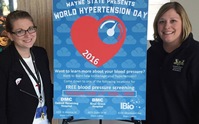
During World Hypertension Day - May 17 - members of the WSU Department of Emergency Medicine offered free blood pressure screenings at Sinai Grace Hospital, Detroit Receiving Hospital and WSU's Integrated Biosciences Center. The event was open to the public and was conducted by student volunteers and a visiting physician from India. The volunteers were trained by emergency department physicians and supervised by clinical research coordinators.
Participants were offered free blood pressure screenings and were asked about their medical history. After blood pressures were recorded, the results were documented on a blood pressure tracker given to the participants for future use. It included diet and exercise tips and local health clinics for follow-up. Those with a history of hypertension were offered a free blood pressure cuff to take home so that they could monitor their blood pressure regularly. The machine given was the same used for the screenings.
"As we were screening people for hypertension and spreading awareness, there was a gentleman who walked up to us. He had a distressed look on his face and seemed short of breath," said Rahul Pansare, M.D., the visiting physician who took part in the screenings at Detroit Receiving Hospital. "He had a history of hypertension and his blood pressure was elevated when I screened him. I could tell something was bothering him. In a pained voice, he said, 'I am at the hospital for a follow-up visit. I just underwent chemotherapy for lung cancer. I used to go to the CVS to get my blood pressure checked, but now I feel short of breath even walking to my bathroom. Please pray for me!' It was thoroughly disheartening to hear that, and I knew that giving him a personal blood pressure monitor could be just a tiny way I could help him cope with his situation."
The screenings were performed in low- to middle-income populations. Those who were screened received information about hypertension-related stroke and cardiovascular disease, and the importance of physical activity and nutrition for preventing or controlling hypertension.
During the World Hypertension Day program at the three locations, 416 people were screened. Of those, 54.47 percent displayed elevated blood pressure a (a pressure greater than 140 systolic/90 diastolic). Nearly 46 percent of those screened that day were being treated with medications for high blood pressure. But, perhaps most surprising, 33 percent of those found to have elevated blood pressure levels were not aware they had hypertension.
Of the 416 participants, 77.6 percent self-identified as African-American and 72.6 were female. Fully 54.57 percent of those screened had elevated blood pressure and 45.91 percent reported currently taking hypertension medication.
Event coordinators said the data will be used to develop future research and community health projects to promote hypertension awareness.